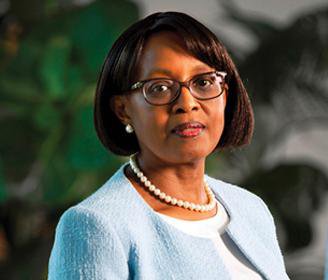There is growing political support for universal health coverage (UHC) on the continent. But is this support translating into action on the ground? The Africa Portal spoke to Dr Matshidiso Moeti, the World Health Organisation’s regional director for Africa, to find out.
This week, the second African Health Forum is taking place in Cabo Verde, bringing African politicians, donor agencies, activists and private sector representatives together to discuss how to achieve Universal Health Coverage in Africa. The goal of UHC is to provide all patients with quality healthcare (including prevention, promotion, treatment, rehabilitation and palliation) without them incurring financial hardship.
It’s a timely discussion. In February this year African government heads, finance ministers, development partners and business leaders launched an initiative to increase spending on health. The launch saw pledges of up to $200 million for African health, while delegates heard that more effective tax collection on the continent could potentially raise another $200 billion annually for healthcare.

But achieving UHC in Africa is a tall order. More than half of Africa’s population currently lacks access to essential health services, and the continent’s population is expected to double by 2050. Moreover, a recent publication by the United Nations Economic Commission for Africa (UNECA) estimates that rising healthcare demands on the continent is creating a financing gap of $66 billion per year.
Against this challenging backdrop, the Cabo Verde forum will focus on how to move from Africa’s lofty UHC ambitions and translate them into practice. To talk about the issues on the table, the Africa Portal caught up with Dr Matshidiso Moeti, WHO regional director for Africa, on the eve of the forum.
AP: Would you say there is unprecedented support for UHC in Africa at the moment?
MM: Yes, definitely. Certainly in terms of political commitment. There have been endorsements of the framework for achieving UHC in Africa produced in 2016 by the WHO and the World Bank. And at the last summit of the African Union [in February 2019], there were strong statements about domestic financing for health. There is action locally in countries like Benin and Burkina Faso, and among some key partners we are seeing not just words but action.
AP: One of the themes for this week’s conference is Taking Universal Health Coverage to the Next Step in Africa. What are those next steps?
MM: Our intention is to build on the political commitment that we are seeing at the moment. One of the key items on the table is financing for health. We are moving to more stringently presenting the investment case to decision-makers and ministers of finance and proving to them that health is a good investment. We also need to share ideas about the best way of reducing the number of people who are out of pocket because of paying for healthcare. How do you do this in a setting where many people depend on informal sector employment? I expect what we do at this meeting is to talk about what has happened and lessons that we have learnt.
AP: How do African healthcare structures need to change to achieve UHC?
MM: Over the past few decades healthcare in Africa has been very disease-specific. That led to the development of vertical programmes, which was not a bad thing, but it has led to significant inefficiencies. We now instead promote what we call people-centred healthcare. That means you don’t just focus on a disease, like HIV or cervical cancer, but instead look at the whole person. It implies many shifts and adjustments in the way that we deliver healthcare in Africa. We need to make better use of the resources we have.
AP: Are there any African countries that have made significant or interesting progress worth noting?
MM: Ghana has been innovative on financing, on how to package services and build a stronger public sector contribution to national health insurance schemes. There we are seeing reasonable levels of health coverage. They have a lot to share with the rest of the continent. Kenya’s president has made a very strong commitment that he’ll go for UHC. Then we have some states in Nigeria where there are interesting partnerships where private sector entities have invested in affordable primary health care. I hope we will throw some of these ideas into the ring at the Africa Health Forum and see how we can adapt them to different settings.
AP: You issued a call a few months ago for African innovators to bring you their ideas so they could be showcased at the forum. Did you get many?
MM: We got more than 2 000 applications from people who live in the reality of African healthcare and understand the context. We invited 10 of the best innovators to come to Cabo Verde, and there will be a session this week to talk about innovation.They will be recognised for what they have done, and will be linked up with some potential financial backers. I think technology is a potential game changer in African health. There is so much creativity out there.
This interview has been edited for clarity.
(Main image: A Sudanese nurse prepares an inoculation against measles at the Samir Medical Clinic in the Sahafa neighbourhood of the Sudanese capital, Khartoum, on 22 June 2015. – Ashraf Shazly/AFP/Getty Images)
The opinions expressed in this article are those of the author(s) and do not necessarily reflect the views of SAIIA or CIGI.


